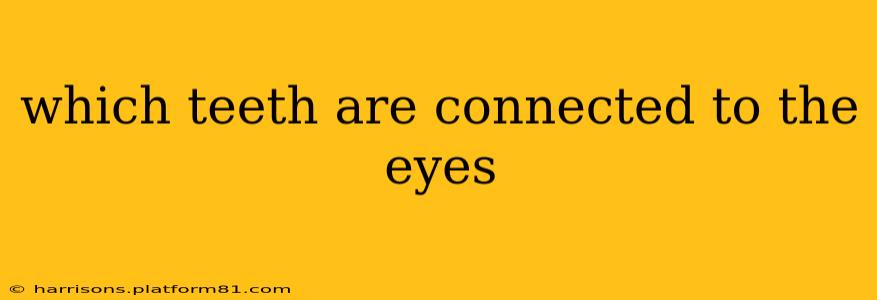Which Teeth Are Connected to the Eyes? The Truth About Tooth-Eye Relationships
The idea that specific teeth are directly connected to the eyes is a common misconception, often rooted in traditional medicine or folk beliefs. There's no scientific evidence supporting a direct anatomical or neurological link between individual teeth and the eyes. However, the concept persists, leading to many questions. Let's delve into the truth and address some common queries.
What is the basis of the belief that teeth are connected to the eyes?
The belief likely stems from a combination of factors. One is the shared innervation of the face and head by cranial nerves. These nerves control sensation and motor function in the face, including the teeth and eyes. However, this shared innervation doesn't imply a direct connection between specific teeth and the eyes in the way some believe. Another potential source is the body's interconnectedness; inflammation or infection anywhere in the body can sometimes lead to systemic effects, but this is a general inflammatory response, not a specific tooth-eye link.
Are there any conditions where dental problems could indirectly affect the eyes?
While there's no direct connection, dental problems can indirectly affect eye health. For example:
- Infections: Severe dental infections, such as periodontal disease (gum disease), can lead to the release of bacteria into the bloodstream. In rare cases, this bacteremia could potentially contribute to complications elsewhere in the body, including the eyes. This isn't a direct connection, but rather a systemic inflammatory response.
- Stress: Dental pain and anxiety related to dental problems can cause significant stress, and chronic stress is linked to various health problems, including eye conditions like dry eye disease or exacerbated glaucoma.
- Jaw problems: Problems with the temporomandibular joint (TMJ), which connects the jaw to the skull, can sometimes manifest as headaches or even affect eye muscles, causing temporary vision disturbances.
Do upper teeth affect the eyes more than lower teeth?
There is no scientific basis to support this claim. The perceived connection is based on unfounded beliefs and not on any anatomical or physiological evidence. Both upper and lower teeth are connected to the same intricate network of nerves and blood vessels within the head, and any connection to eye health would be indirect and generalized, not specific to upper or lower teeth.
Is there a meridian point connection between teeth and eyes in traditional Chinese medicine?
Traditional Chinese Medicine (TCM) does involve meridian points and energy flows throughout the body, and some interpretations might suggest connections between certain areas and the eyes. However, it's crucial to understand that TCM is a distinct system of medicine with its own theoretical framework and should not be interpreted literally through the lens of Western anatomy. Any claims of meridian connections should be evaluated within the context of TCM principles, and not as a verifiable scientific fact.
Can dental work trigger eye problems?
Dental procedures themselves rarely directly cause eye problems. However, a reaction to anesthesia or medication used during dental procedures is always a possibility, albeit rare. In such instances, it's important to inform your dentist of any allergies or medical conditions, such as glaucoma.
In conclusion, while the idea of a direct connection between specific teeth and the eyes is a myth, it's crucial to maintain good oral hygiene and seek professional dental care for any dental problems. If you experience vision problems, consult an ophthalmologist. The shared innervation and the potential for systemic inflammatory response highlight the importance of holistic health, but it doesn't support the claim of a direct link between individual teeth and the eyes.
